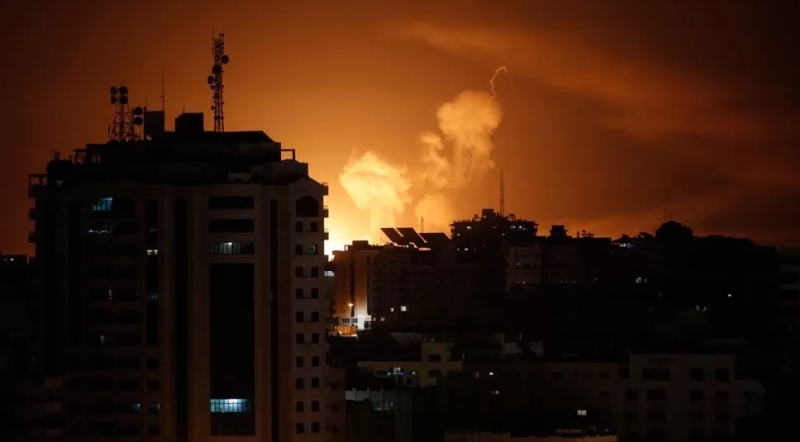- India Sees 9% Drop in Foreign Tourists as Bangladesh Visits Plunge |
- Dhaka Urges Restraint in Pakistan-Afghan War |
- Guterres Urges Action on Safe Migration Pact |
- OpenAI Raises $110B in Amazon-Led Funding |
- Puppet show enchants Children as Boi Mela comes alive on day 2 |
The World & The OIC Must Act: Gaza Cannot Endure Endless War

Israeli strike on Gaza City on April 6. AP Photo
The unfolding crisis in Gaza demands urgent global attention and action. The recent statement from the UNRWA chief—"No escape, death follows families in Gaza wherever they go"—is a stark reminder that the situation has reached an intolerable limit. Reports indicating that Prime Minister Netanyahu’s aim is to drive Palestinians out of Gaza raise deeply troubling questions about the fate of an entire people. Now, even as a ceasefire agreement has been reached, Netanyahu has vowed to continue the war, reinforcing the grim reality that for Gazans, suffering has no reprieve.
For the millions trapped in Gaza, daily life has become synonymous with unimaginable hardship. Families torn from their homes wander through devastated streets, searching for safety where none exists. Hospitals, overwhelmed and under siege, struggle to provide care as medical supplies dwindle. With borders sealed and aid blocked, starvation has become an intentional weapon of war—one that punishes innocent civilians without justification. The ongoing blockade and bombardment are not acts of security; they are acts of erasure.
Gaza has long been at the heart of the Israeli-Palestinian conflict. After the 1948 Arab-Israeli War, Egypt controlled the Gaza Strip, which became home to thousands of Palestinian refugees. In 1967, Israel captured Gaza during the Six-Day War, beginning decades of military occupation. The first Palestinian uprising, or Intifada, erupted in 1987, leading to the formation of Hamas. In 2005, Israel withdrew its settlers and military forces from Gaza, yet the blockade imposed in 2007 after Hamas took control has severely restricted movement and access to essential resources.
Over the years, numerous peace efforts have been initiated: Oslo Accords (1993-1995): Designed to establish Palestinian self-governance, the accords raised hopes but ultimately failed to deliver lasting peace. Gaza remains under extreme restrictions.
Israeli Disengagement (2005): The withdrawal of Israeli settlers and military forces was seen as a step toward peace, but it was followed by the blockade, crippling life in Gaza.
Ceasefire Agreements: Temporary ceasefires, mediated by Egypt, Qatar, and the UN, have repeatedly failed, as violence inevitably resumes.
Recent Peace Summits: The Palestine Summit (2025) saw Arab leaders attempt a unified approach, yet little has been achieved beyond rhetoric.
Humanitarian and Diplomatic Efforts: Despite calls for intervention from international organizations and Western governments, no meaningful resolution has emerged.
The pattern is clear: every initiative ultimately collapses under the weight of continued aggression, displacement, and destruction. The war remains one-sided, with Palestinians bearing the brunt of suffering while the international community stands by, issuing statements that fail to translate into action.
Mere condemnation from the international community, including the Organisation of Islamic Cooperation (OIC), is insufficient. Words alone will not halt the atrocities being committed against the people of Gaza. If the OIC and other global actors fail to coordinate a collective economic response against these war crimes and crimes against humanity, then their protests will remain empty rhetoric. History has repeatedly shown that injustice thrives when accountability is weak. If the world allows this to continue, it will not be an isolated tragedy—it will be a precedent for unchecked impunity.
The truth is clear: even the weakest, when united and resolute, can challenge oppression at any cost. A world that maintains a heaven beside a man-made hell cannot endure. The international community must recognize that indifference to injustice today will inevitably lead to larger consequences tomorrow. If the line has been crossed, then the world must respond—not with words, but with action. The time for hesitation is over. The time to stand for humanity is now.

